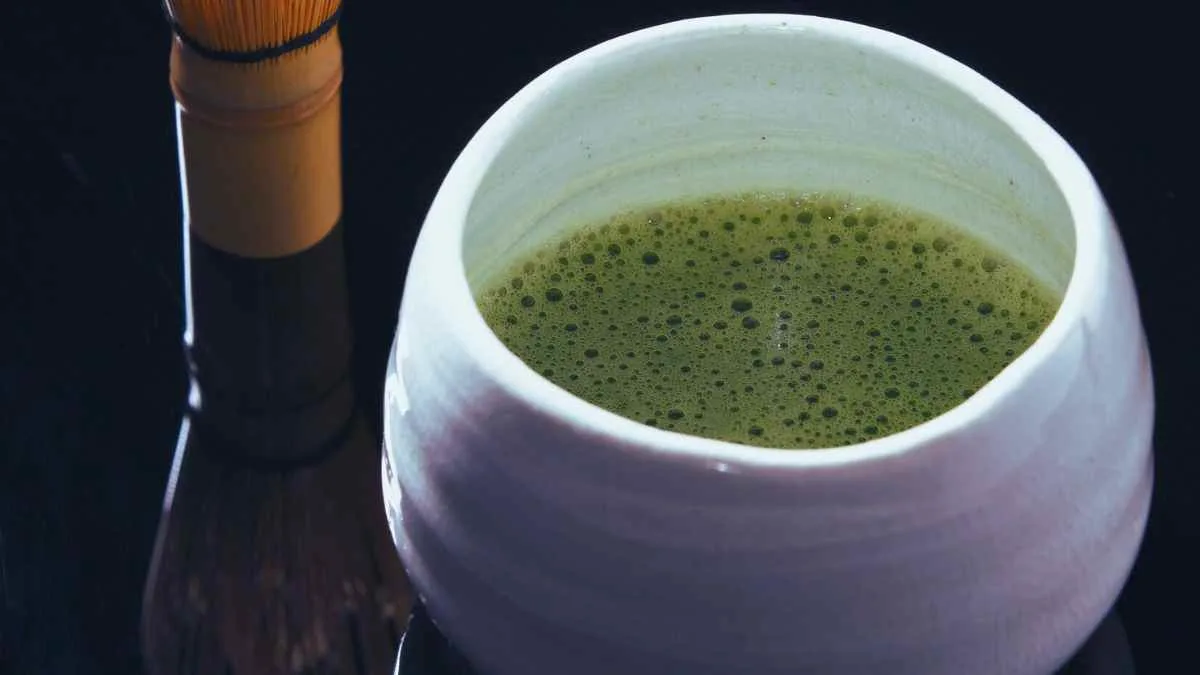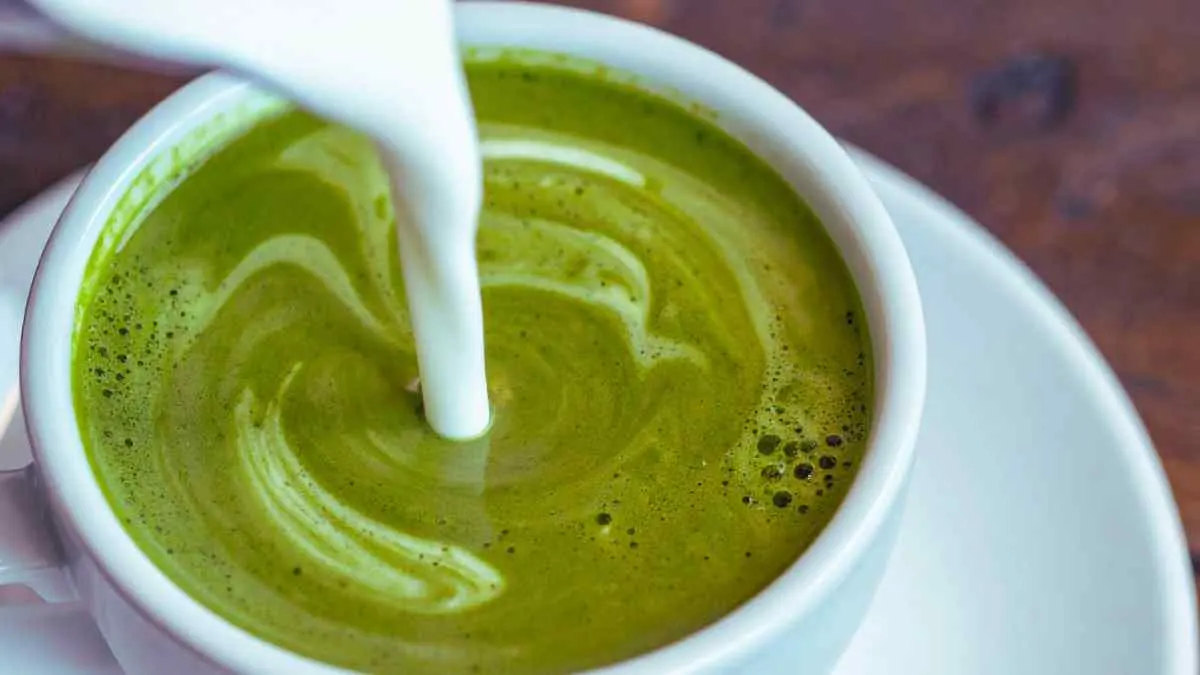Matcha tea is a powdered green tea made from finely ground leaves of the Camellia sinensis plant, traditionally grown and consumed in Japan.
It is known for its rich, earthy flavor and vibrant green color. Unlike regular green tea, where the leaves are steeped and discarded, matcha involves consuming the entire leaf, offering a concentrated source of antioxidants, vitamins, and minerals.
Matcha is praised for its health benefits, including boosting metabolism, enhancing focus, and promoting relaxation without the jitters commonly associated with caffeine.
What is Matcha Tea?
Matcha tea is made from the leaves of the Camellia sinensis plant, the same plant used for other types of green tea. What sets matcha apart is its cultivation and preparation process.
Matcha plants are grown under shade for several weeks before harvesting, which increases the chlorophyll content and enhances the tea’s vibrant green color.
After harvesting, the leaves are steamed, dried, and then ground into a fine powder. This powder is whisked with hot water, allowing you to consume the entire leaf and its full spectrum of nutrients, rather than discarding the leaves as with traditional tea brewing.
The flavor of matcha is described as rich and umami, with grassy, vegetal notes. Its smooth, slightly bitter taste can be balanced with sweeteners or milk, making it versatile for different palates.
Matcha is often used in various beverages, from the traditional Japanese tea ceremony to modern-day lattes, smoothies, and even baked goods.
Health Benefits of Matcha Tea:
-
Packed with Antioxidants:
One of the most significant benefits of matcha tea is its high antioxidant content. Matcha is rich in catechins, particularly epigallocatechin gallate (EGCG), a powerful antioxidant known for its cancer-fighting properties. According to Dr. Josh Axe, a leading nutritionist, EGCG has been shown to protect against free radical damage, reduce inflammation, and lower the risk of chronic diseases, including heart disease. -
Boosts Metabolism and Supports Weight Loss:
Matcha tea has gained attention for its potential weight loss benefits. The antioxidants and compounds in matcha, particularly catechins, have been found to enhance fat burning and improve metabolism. A study published in the American Journal of Clinical Nutrition found that the combination of caffeine and catechins in green tea (and matcha) can significantly increase fat oxidation, helping individuals burn fat more effectively. Matcha has been shown to boost calorie expenditure, making it an excellent choice for anyone looking to support weight management. -
Enhances Mental Clarity and Focus:
Matcha contains a unique combination of caffeine and L-theanine, an amino acid that promotes relaxation and improves concentration. The caffeine in matcha provides a steady, long-lasting energy boost without the jitteriness that often accompanies coffee. Dr. Michael Apolito, a renowned health expert, explains that L-theanine, which is found in matcha, helps to calm the mind, reduce anxiety, and enhance focus, making it an excellent choice for individuals seeking a balanced, productive energy boost. -
Promotes Relaxation and Reduces Stress:
The L-theanine in matcha is also known for its stress-reducing effects. This amino acid can induce a calm, focused state, which helps mitigate the stress response caused by caffeine. Consuming matcha promotes a sense of well-being and tranquility without causing the crash often associated with coffee consumption. According to Dr. John Smith, a clinical psychologist, this calming effect is beneficial for improving mental health and managing daily stress. -
Supports Heart Health:
The catechins found in matcha, particularly EGCG, have been shown to help lower cholesterol levels and reduce the risk of heart disease. According to the American Heart Association, regular consumption of green tea (including matcha) can improve heart health by reducing bad cholesterol (LDL), lowering blood pressure, and improving blood vessel function. These benefits contribute to a reduced risk of cardiovascular diseases. -
Detoxifies the Body:
Matcha is high in chlorophyll, the green pigment responsible for photosynthesis in plants. Chlorophyll is known for its detoxifying properties, as it helps eliminate toxins and heavy metals from the body. This makes matcha an excellent beverage for supporting detoxification, cleansing the liver, and improving overall health.
How to Prepare Matcha Tea:

Preparing matcha tea is simple, but it requires the right tools and technique to get the perfect cup. The traditional method involves using a bamboo whisk and a bowl, but it can also be made with modern tools like a milk frother or electric whisk.
Ingredients:
-
1-2 teaspoons of matcha powder (ceremonial grade for the best flavor)
-
8 ounces of hot water (not boiling, around 175°F)
-
Optional: Sweetener (honey, stevia) or milk (for matcha lattes)
Instructions:
-
Sift the matcha powder into a bowl to remove any clumps and ensure a smooth texture.
-
Heat the water to around 175°F (just below boiling). If the water is too hot, it can cause the matcha to become bitter.
-
Pour the hot water into the bowl with the matcha powder.
-
Use a bamboo whisk (or electric whisk) to vigorously whisk the matcha in a “W” or “M” motion until the tea becomes frothy and well-blended.
-
Taste and adjust the sweetness if desired, adding honey or sweetener to suit your preferences.
-
Serve immediately and enjoy the vibrant green, antioxidant-rich drink.
Read Next: 5 Herbal Tea For Weight Loss At Home
2. Matcha Latte Recipe:

For a creamy twist, try making a matcha latte:
Ingredients:
-
1-2 teaspoons matcha powder
-
8 ounces milk (dairy or non-dairy)
-
1 teaspoon honey or sweetener (optional)
-
8 ounces hot water
Instructions:
-
Prepare the matcha by sifting the powder into a bowl and adding hot water.
-
Whisk the matcha until frothy.
-
Heat your milk in a saucepan or microwave until warm.
-
Froth the milk using a milk frother or whisk until creamy.
-
Pour the matcha into a cup and top with frothed milk.
-
Stir in honey or sweetener if desired.
-
Enjoy your creamy matcha latte!
Whats In Your Head?
Q. Does matcha contain caffeine?
Yes, matcha contains caffeine, but in a different form than coffee. The caffeine in matcha is released more slowly, providing a steady, long-lasting energy boost without the crash.
Q. Is matcha tea better than regular green tea?
While both matcha and green tea come from the same plant, matcha is more concentrated because you consume the whole leaf. Matcha contains more antioxidants, caffeine, and nutrients compared to regular green tea.
Q. Can I drink matcha every day?
Yes, matcha can be consumed daily. However, due to its caffeine content, it is advisable to limit consumption to 1-2 servings per day to avoid excessive caffeine intake.
Q. What does matcha taste like?
Matcha has a unique flavor that is slightly bitter, grassy, and vegetal, with a creamy, umami finish. Its flavor can be enhanced by adding sweeteners or milk, especially in a matcha latte.
Q. Can matcha help with weight loss?
Yes, matcha has been shown to boost metabolism and increase fat burning, making it a helpful addition to a weight management plan.

